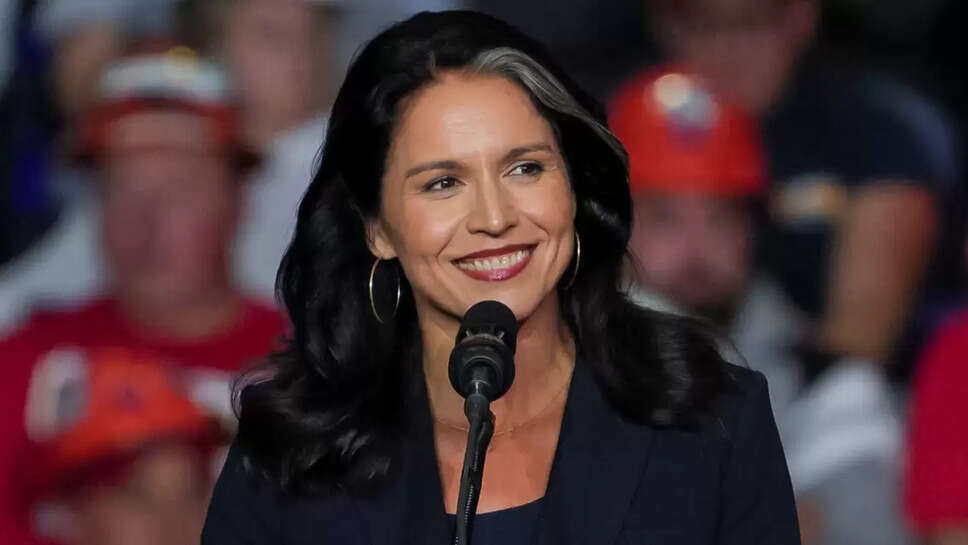Gabbard Resurfaces at White House, Echoes Trump’s Narrative on Russia Probe

In a development that caught Washington off guard, former Democratic congresswoman and 2020 presidential candidate Tulsi Gabbard appeared at the White House unexpectedly this week and used the moment to launch a fierce criticism of the Russia investigation and those she described as “Trump’s political enemies.”
Once a maverick figure within the Democratic Party, Gabbard has increasingly aligned herself with anti-establishment, often conservative, critiques of America’s political elite. Her statements at the White House—unusual not just for their content but also for the platform—underscored what many see as her continuing drift toward Republican and Trump-adjacent narratives.
A Surprise Entrance, a Familiar Message
Gabbard’s presence at the White House briefing room was unannounced. Appearing alongside a mid-level communications official rather than a top-ranking figure, she nonetheless seized the podium to deliver a scathing monologue focused on what she characterized as the “weaponization of federal institutions” during and after the 2016 election.
“This was never about justice. It was about power,” Gabbard said. “The Russia investigation wasn’t a neutral legal inquiry—it was an attempt to delegitimize a sitting president.”
Without naming specific individuals, she referred to “intelligence officials who lied,” “media outlets that pushed disinformation,” and “members of Congress who knew better but said nothing.” The language bore striking resemblance to claims often made by Donald Trump himself and his close allies.
Bridging the Divide—or Burning It Further?
While Gabbard has long branded herself as an independent thinker—once resigning as DNC vice chair to endorse Bernie Sanders—her appearance at the White House was viewed by many as a deliberate signal. It wasn’t simply her remarks, but where she delivered them that stirred intrigue.
“She didn’t have to go to the White House to say this,” noted a political strategist in D.C. “She chose that setting for a reason. It’s a message to the Republican base—and maybe even to Trump—that she’s one of them now.”
The implications are notable. With speculation already circulating about Trump’s potential running mates in 2024 or other key figures in the GOP’s future, some see Gabbard’s move as a strategic audition for a more prominent role within conservative circles.
The Russia Probe: Still a Political Fault Line
Though years have passed since Special Counsel Robert Mueller released his report on Russian interference in the 2016 election, the investigation continues to cast a long political shadow. For Trump and his loyalists, the probe symbolizes what they see as a deep-state conspiracy aimed at thwarting an outsider presidency.
Gabbard’s comments mirrored many of those grievances, including:
-
The claim that federal intelligence and law enforcement officials exaggerated or manipulated evidence.
-
Accusations that media figures “knowingly” spread falsehoods for partisan purposes.
-
Assertions that the probe undermined public trust in government rather than restoring it.
“Whether you liked Trump or not,” Gabbard said, “every American should be concerned about what this precedent means for future presidents, especially those who challenge the establishment.”
Reaction from Across the Aisle
Her remarks were instantly polarizing. Progressive commentators were quick to denounce her appearance as political opportunism wrapped in populist rhetoric. “Tulsi Gabbard has officially abandoned any pretense of neutrality,” wrote one liberal columnist. “This was a MAGA rally disguised as a press briefing.”
On the other hand, some conservative figures welcomed the statements. Several Fox News contributors and right-leaning influencers praised her for “telling the truth” and “breaking ranks with D.C. elites.”
Even Trump himself, via a social media post on Truth Social, seemed to reference Gabbard’s comments, saying, “Glad to see more people waking up to what was really happening. Great courage being shown lately!”
Not Her First Controversial Stance
Gabbard has long charted her own political course, often frustrating both parties. She opposed U.S. intervention in Syria and even met with Syrian President Bashar al-Assad—a move that drew sharp criticism. She has consistently spoken out against “regime change wars” and criticized President Biden’s foreign policy as overly aggressive and reliant on military solutions.
Domestically, she has questioned COVID mandates, taken issue with “woke” cultural politics, and recently voiced skepticism over transgender policies in schools—earning both scorn and admiration depending on the audience.
Her appearance at the White House this week only added fuel to speculation that she may be preparing for a formal break from the Democratic Party, if not already making one unofficially.
A Future in the Republican Party?
Though Gabbard has not confirmed any new political affiliation, she has appeared frequently on conservative media outlets, campaigned for Republican candidates in the midterms, and increasingly adopted rhetoric associated with right-leaning populism.
Some insiders believe she is positioning herself as either:
-
A vice-presidential pick for Donald Trump or another GOP candidate,
-
A media personality with crossover appeal, or
-
A third-party or independent candidate, though that route remains politically risky.
“She’s smart, charismatic, and willing to go against the grain,” said a former Trump advisor. “That’s a profile Trump appreciates. Whether that translates into a formal alliance remains to be seen.”
What It Means Going Forward
Tulsi Gabbard’s White House appearance, while symbolic in nature, points to deeper shifts underway in American politics. The traditional lines between left and right are blurring, as populist sentiments from both ends of the spectrum find common cause in mistrust of institutions, media, and entrenched power structures.
Her critique of the Russia investigation wasn’t just about revisiting 2016—it was about redefining how truth, accountability, and power are understood in the post-Trump era.
As the 2024 election cycle heats up, figures like Gabbard may play a significant role—not because they fit neatly into partisan categories, but because they don’t.
And in a country as divided as America today, that might be her most potent weapon—or her greatest liability.
.jpg)